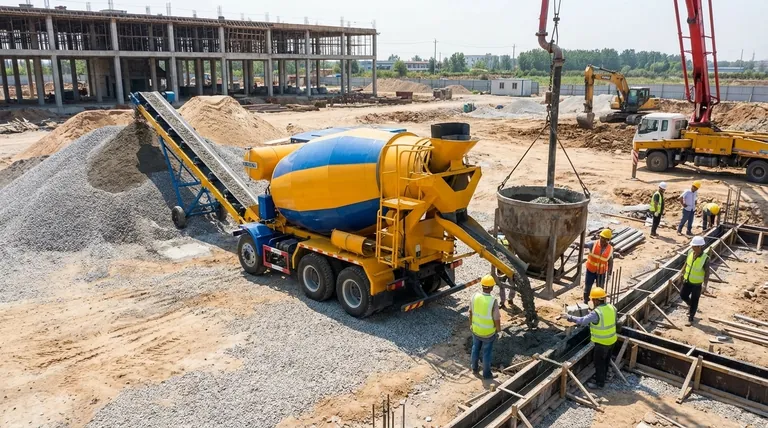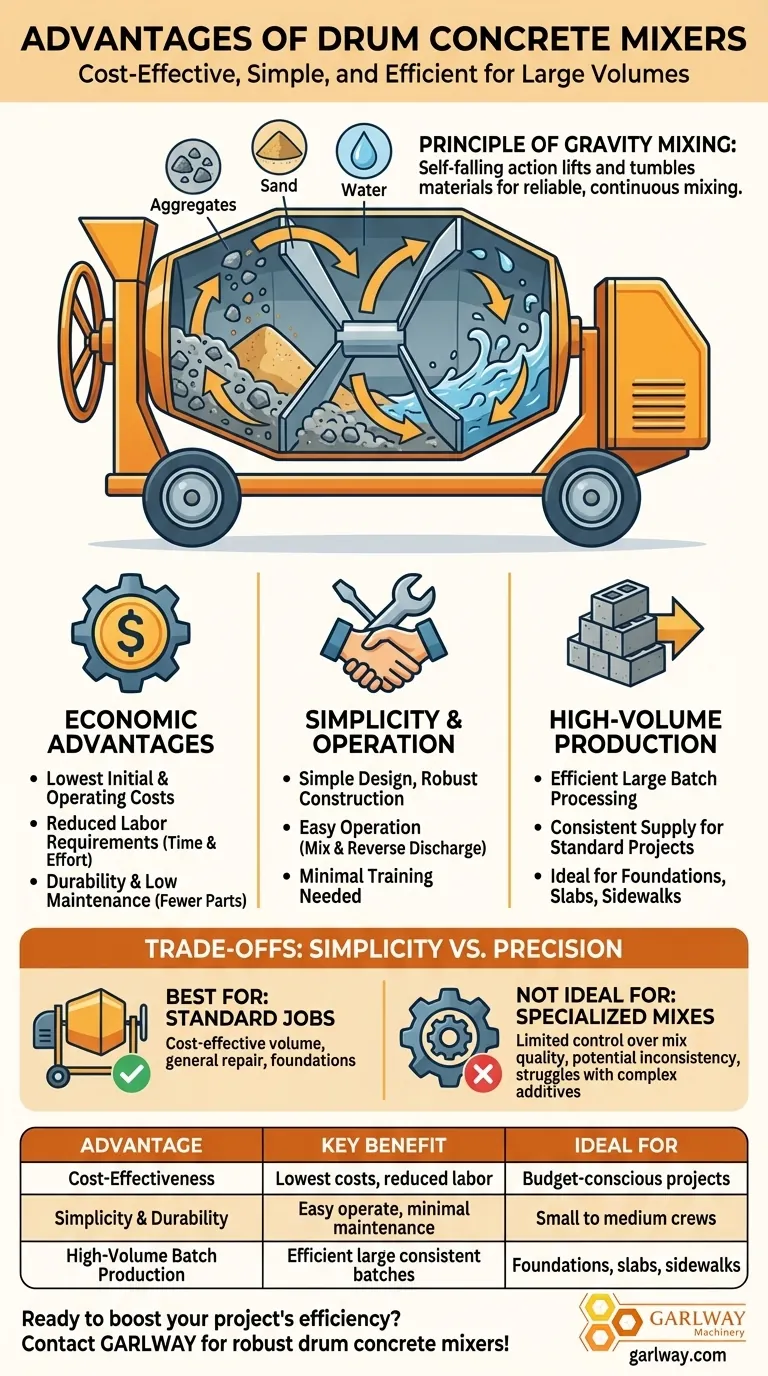The primary advantages of a drum concrete mixer are its exceptional cost-effectiveness, simplicity of operation, and ability to efficiently produce large volumes of concrete. These characteristics make it a foundational piece of equipment for a wide range of standard construction projects where budget and output are the main priorities.
A drum mixer is the go-to choice for producing standard concrete in large batches at the lowest possible cost. Its core strengths are simplicity and volume, but this comes at the expense of the precision required for highly specialized mix designs.

How a Drum Mixer Achieves Its Efficiency
The design of a drum mixer is elegantly simple, leveraging basic physics to achieve a reliable mix with minimal mechanical complexity. This simplicity is the source of its primary benefits.
The Principle of Gravity Mixing
A drum mixer is often called a "self-falling" or "gravity" mixer. As the drum rotates, internal fins or blades lift the aggregates, sand, cement, and water to the top of the drum.
Gravity then causes the materials to tumble back down, creating the mixing action. This continuous cycle ensures all ingredients are eventually combined.
Simple Design, Simple Operation
The mechanics are straightforward: one direction of rotation mixes the concrete, and reversing the rotation discharges it. This simple operation requires minimal training and reduces the potential for user error.
Its design, focused on a single rotating component, makes it mechanically robust and easy to manage on a busy job site.
Built for Batch Production
Drum mixers are designed to handle entire batches of concrete at once. This makes them highly effective for small to medium-sized projects like foundations, slabs, or sidewalks where a consistent supply of concrete is needed.
The Key Economic Advantages
For many projects, the financial case for a drum mixer is the most compelling factor. It excels at lowering the costs associated with producing concrete on-site.
Low Initial and Operating Costs
Among all mixer types, the drum mixer generally has the lowest upfront purchase price and the most affordable operating costs. Its energy-efficient gravity mechanism and simple design keep power consumption and wear-and-tear to a minimum.
Reduced Labor Requirements
Compared to mixing concrete manually, a drum mixer drastically saves time and reduces the physical effort required. This allows a smaller crew to produce a significantly larger amount of concrete, directly lowering labor expenses.
Durability and Low Maintenance
Fewer moving parts mean fewer points of failure. The rugged construction of a standard drum mixer is built for the harsh conditions of a construction site, leading to a long service life with minimal maintenance needs.
Understanding the Trade-offs: Simplicity vs. Precision
The very simplicity that makes the drum mixer so effective also defines its limitations. Its reliance on gravity mixing is not ideal for every application.
Limited Control Over Mix Quality
The tumbling action of a gravity mixer is less forceful than the shearing action found in other mixer types. This can make it difficult to achieve the perfect homogeneity required for high-performance or architectural concrete.
Potential for Inconsistency
While effective for general use, drum mixers can exhibit slight variations from one batch to the next. This lack of guaranteed consistency makes them less suitable for projects where every batch must meet strict, verifiable specifications.
Less Flexibility for Complex Mixes
Specialized concrete designs that include additives, fibers, or very low water-to-cement ratios require a more aggressive mixing action to ensure all components are properly dispersed. A drum mixer may struggle to adequately process these complex formulas.
Making the Right Choice for Your Project
Selecting the right mixer depends entirely on the requirements of your concrete. The drum mixer is a powerful tool when used for its intended purpose.
- If your primary focus is cost-effective volume for standard jobs: The drum mixer is the undisputed best choice for foundations, sidewalks, and general repair work.
- If your primary focus is high-strength, architectural, or specialized concrete: The drum mixer's lack of precision makes it a poor fit; you should look to more advanced pan or twin-shaft mixers.
- If your primary focus is portability and ease of use on small to medium sites: The drum mixer's typically smaller footprint and straightforward operation make it an excellent and versatile asset.
Ultimately, choosing a drum mixer is a decision for efficiency and economy in the most common concrete applications.
Summary Table:
| Advantage | Key Benefit | Ideal For |
|---|---|---|
| Cost-Effectiveness | Lowest initial & operating costs, reduced labor | Budget-conscious projects |
| Simplicity & Durability | Easy to operate, minimal maintenance, long service life | Small to medium-sized crews |
| High-Volume Batch Production | Efficiently produces large, consistent batches for standard mixes | Foundations, slabs, sidewalks |
Ready to boost your project's efficiency with a reliable concrete mixer?
GARLWAY specializes in providing robust construction machinery, including high-performance drum concrete mixers, for construction companies and contractors globally. Our mixers are engineered for durability and cost-effectiveness, helping you complete projects on time and within budget.
Contact GARLWAY today to find the perfect mixer for your needs and get a quote!
Visual Guide

Related Products
- HZS90 Large Multiquip Concrete Mixers for Construction
- Construction Products Concrete Plant Machine Mixing Concrete Mixer
- JDC350 Small Cement Concrete Mortar Mixer
- Concrete Cement Mixer Machine Drum Mixer for Construction
- Commercial Construction Mixer Machine for Soil Cement Mixing Concrete
People Also Ask
- Is there a difference between a concrete mixer and a mortar mixer? Choose the Right Machine for Your Project
- How does concrete not harden in a truck? The Role of Continuous Agitation Explained
- Are there different types of concrete mix? Discover the Right Recipe for Your Project's Success
- What are the pros and cons of concrete mixers? Boost Efficiency & Quality on Your Job Site
- What are the 4 classifications of concrete mix? Choose the Right Mix for Your Project's Success



















